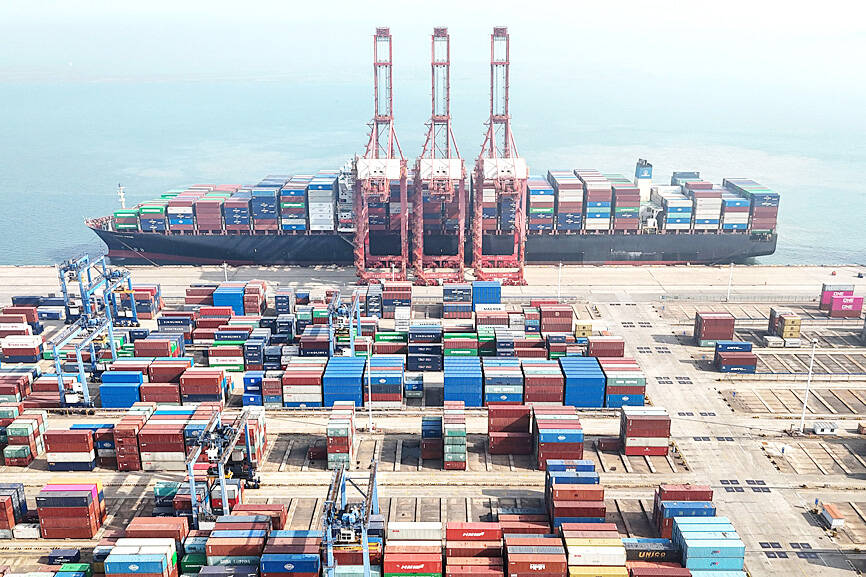China’s exports slumped last month, dealing a blow to hopes that booming sales abroad would offset weak demand at home and drive growth in the world’s second-largest economy.
Exports shrank 7.5 percent in US dollar terms last month from a year earlier, while imports fell 1.9 percent, the Chinese General Administration of Customs said yesterday.
Both numbers came in well below economists’ forecasts. The trade surplus for the month was almost US$59 billion.

Photo: AFP
Bright spots in earlier data, especially from trade and industry, had offered encouragement that China’s goal this year of about 5 percent economic growth was within reach.
Manufacturing companies reported an expansion for the first time since September and new export orders also picked up after contracting for months. Banks including Goldman Sachs and Morgan Stanley raised their annual growth forecasts this week.
“Taking the positive surprise seen earlier this year, we still view that exports should be on a recovering trend, but modestly,” Societe Generale SA Greater China economist Michelle Lam (林雪潔) said. “The data may also lead to some less aggressive expectations for first-quarter GDP out next week.”
That number is due out on Tuesday, along with a raft of other data from retail sales to industrial output that would offer a clearer picture of the outlook.
Expectations that China would rely on demand in other nations to meet growth targets have helped stoke trade tensions with the US and Europe.
Those are not likely to fade even after last month’s slowdown because in some contentious areas China’s foreign sales are still advancing.
Exports of steel products rose 31 percent in the first three months of the year, the most since 2016. Back then, the EU, the US and Japan complained about Chinese steel overcapacity driving down global prices — concerns that have resurfaced in the past year.
In manufactured goods including vehicles and semiconductors — two areas where Western nations are trying to fend off Chinese competition — exports recorded double-digit percentage growth in US dollar terms in the first three months of the year.
Phone sales declined, but the actual number of phones shipped overseas rose 6.3 percent, illustrating how Chinese firms are slashing prices.
Generally, last month’s data need to be set in context of the previous two months, and quarterly data offer a more reliable guide, Pinpoint Asset Management (保銀私募基金管理) president Zhang Zhiwei (張智威) said.
On that basis exports rose 1.5 percent year-on-year, compared with a fourth-quarter contraction, which “shows a reasonable story about external demand,” Zhang said.
Other Asian nations have benefited from signs of improving international demand, with sales to the US and elsewhere driving a continued expansion in Taiwanese and South Korean exports last month.

Hon Hai Precision Industry Co (鴻海精密) yesterday said that its research institute has launched its first advanced artificial intelligence (AI) large language model (LLM) using traditional Chinese, with technology assistance from Nvidia Corp. Hon Hai, also known as Foxconn Technology Group (富士康科技集團), said the LLM, FoxBrain, is expected to improve its data analysis capabilities for smart manufacturing, and electric vehicle and smart city development. An LLM is a type of AI trained on vast amounts of text data and uses deep learning techniques, particularly neural networks, to process and generate language. They are essential for building and improving AI-powered servers. Nvidia provided assistance

DOMESTIC SUPPLY: The probe comes as Donald Trump has called for the repeal of the US$52.7 billion CHIPS and Science Act, which the US Congress passed in 2022 The Office of the US Trade Representative is to hold a hearing tomorrow into older Chinese-made “legacy” semiconductors that could heap more US tariffs on chips from China that power everyday goods from cars to washing machines to telecoms equipment. The probe, which began during former US president Joe Biden’s tenure in December last year, aims to protect US and other semiconductor producers from China’s massive state-driven buildup of domestic chip supply. A 50 percent US tariff on Chinese semiconductors began on Jan. 1. Legacy chips use older manufacturing processes introduced more than a decade ago and are often far simpler than

STILL HOPEFUL: Delayed payment of NT$5.35 billion from an Indian server client sent its earnings plunging last year, but the firm expects a gradual pickup ahead Asustek Computer Inc (華碩), the world’s No. 5 PC vendor, yesterday reported an 87 percent slump in net profit for last year, dragged by a massive overdue payment from an Indian cloud service provider. The Indian customer has delayed payment totaling NT$5.35 billion (US$162.7 million), Asustek chief financial officer Nick Wu (吳長榮) told an online earnings conference. Asustek shipped servers to India between April and June last year. The customer told Asustek that it is launching multiple fundraising projects and expected to repay the debt in the short term, Wu said. The Indian customer accounted for less than 10 percent to Asustek’s

Gasoline and diesel prices this week are to decrease NT$0.5 and NT$1 per liter respectively as international crude prices continued to fall last week, CPC Corp, Taiwan (CPC, 台灣中油) and Formosa Petrochemical Corp (台塑石化) said yesterday. Effective today, gasoline prices at CPC and Formosa stations are to decrease to NT$29.2, NT$30.7 and NT$32.7 per liter for 92, 95 and 98-octane unleaded gasoline respectively, while premium diesel is to cost NT$27.9 per liter at CPC stations and NT$27.7 at Formosa pumps, the companies said in separate statements. Global crude oil prices dropped last week after the eight OPEC+ members said they would